- Administrator
- Albums and Singles
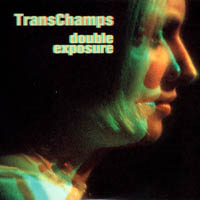 New levels of ironica are reached on this extended play single when retrofitted 1980s heavy metal and analogue techno rock collide. Thinking back a couple decades, I recall that fans of both camps would despise each other. Take a look at Heavy Metal Parking Lot for clues. Today, however, the music is being warmly embraced by indie rock hipsters. Two groups of three members: the Fucking Champs (who I swear are the pawns in a diabolacal plot from Yngwie Malmsteen to stage a crossover attack into the sweater-clad Buddy Holly glasses-wearing indie crowd) versus Trans Am (who confuse me to this day whether they're paying tribute to or parodizing ZZ Top and Kraftwerk).
New levels of ironica are reached on this extended play single when retrofitted 1980s heavy metal and analogue techno rock collide. Thinking back a couple decades, I recall that fans of both camps would despise each other. Take a look at Heavy Metal Parking Lot for clues. Today, however, the music is being warmly embraced by indie rock hipsters. Two groups of three members: the Fucking Champs (who I swear are the pawns in a diabolacal plot from Yngwie Malmsteen to stage a crossover attack into the sweater-clad Buddy Holly glasses-wearing indie crowd) versus Trans Am (who confuse me to this day whether they're paying tribute to or parodizing ZZ Top and Kraftwerk).
What the collective appears to have agreed on is having two songs featuring double-soloing guitars a'la Joe Satriani, two mid-tempo tunes heavy on the electronic low-end, and one drum-free easygoing acoustic thing smack-dab in the middle, containing violin and flute, sounding the most remotely distant from what each group has released on their own. I must admit I wasn't really digging this at first but after many many listens I can safely say this is an awesome release - abstract enough to be cool, cliche enough to be funny and short so it never gets irritating!
samples:
 
Read More
- Administrator
- Albums and Singles
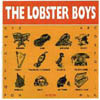 Lars Pedersen is the main man behind When and this is his 8th fulllength album since 1983, 2nd for Jester Records (not counting the 2disc retrospective "WriterCakebox"). 1999's "Psychedelic Wunderbaum"greatly impressed me with it's curiously fun collection of eccentricavante pop and just plain avante. "The Lobster Boys" has done the same.The back cover wallpaper of oldies children's, educational, jazz andclassical records presumably gives a good clue to the source of some ofthe sampled passages and sounds that Pedersen grafts to his own vocals,organ, guitar, bass, xylophone and drum playing. And many other soundsfind their way into the cut and paste mix, some thanks to a few otherplayers: piano, sitar, guitar, flamenco guitar, viola, melodica andindustrial rhythms. There is an indelible happy-go-lucky spirit andlate '60s pop vibe throughout When's songs. "Flower Jam", "SunshineSuperhead" and "Instant Flute" have an uncanny similarity to recentWeen while "The Greatest Sorrow on Earth" and "Puff Pipe" make the bestuse of mellow jazz loops. It's all fun and games up until "RuinYourself" takes a decidedly darker turn, repeating the increasinglycreepy mantra "all together now / all together now / all together nowmy friends / together we ruin ourself". There really should be a singlefor this one. I can't get it out of my head and I don't want to. Anunlisted 16+ minute track is the finale, eventually settling into ahypnotic distorted mass that cleverly concludes with a woman's voicesoftly approving "what a pretty tune, please play it again soon". "TheLobster Boys" is one of those albums you can play anytime, anywhere foranyone. It refuses to be pigeonholed and refuses to be boring. Justlike everything else from When and Jester.
Lars Pedersen is the main man behind When and this is his 8th fulllength album since 1983, 2nd for Jester Records (not counting the 2disc retrospective "WriterCakebox"). 1999's "Psychedelic Wunderbaum"greatly impressed me with it's curiously fun collection of eccentricavante pop and just plain avante. "The Lobster Boys" has done the same.The back cover wallpaper of oldies children's, educational, jazz andclassical records presumably gives a good clue to the source of some ofthe sampled passages and sounds that Pedersen grafts to his own vocals,organ, guitar, bass, xylophone and drum playing. And many other soundsfind their way into the cut and paste mix, some thanks to a few otherplayers: piano, sitar, guitar, flamenco guitar, viola, melodica andindustrial rhythms. There is an indelible happy-go-lucky spirit andlate '60s pop vibe throughout When's songs. "Flower Jam", "SunshineSuperhead" and "Instant Flute" have an uncanny similarity to recentWeen while "The Greatest Sorrow on Earth" and "Puff Pipe" make the bestuse of mellow jazz loops. It's all fun and games up until "RuinYourself" takes a decidedly darker turn, repeating the increasinglycreepy mantra "all together now / all together now / all together nowmy friends / together we ruin ourself". There really should be a singlefor this one. I can't get it out of my head and I don't want to. Anunlisted 16+ minute track is the finale, eventually settling into ahypnotic distorted mass that cleverly concludes with a woman's voicesoftly approving "what a pretty tune, please play it again soon". "TheLobster Boys" is one of those albums you can play anytime, anywhere foranyone. It refuses to be pigeonholed and refuses to be boring. Justlike everything else from When and Jester.
samples:
Read More
- Administrator
- Albums and Singles
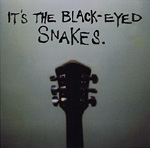 Low fans beware, the full-length release of Alan Sparhawk (asChicken-Bone George) in his psychobilly outfit is now available. It'sgot a thumpin rockabilly beat, distorted voice, squealing guitars andharmonica. Of the ten tracks here, two are new takes on older things."Lordy" was first recorded with the Dirty Three for the 'Fishtank' EPand performed frequently by Low alone on the most recent tour and"Honey" was made popular by Moby only a couple years back. Here, bothget a deep south blues overhaul, a'la New Orleans-stylie, matching thestyle of the rest of the disc. Although it sounds like many of thesesongs were spontaneously tossed together, they're executed with anamazingly authentic sounding precision, subject matter aside. "8 InchKnife" is from the perspecive of a wandering man coming face-to-facewith his wife's kitchen knife, "Mannish Boy" needs no explaination and"Cheerios on the Floor" is dedicated to Hollerin' Hollis Mae (a.k.a.Alan and Mimi's young daughter). The Black Eyed Snakes is nothing shortof fun, and sounds like it was as much making it as it is listening in.The debut is ideal for playing while barbecuing ribs and fixin' somecollard greens along with hush puppies. You can catch the group on theroad with Man or Astro-Man across the USA right now.
Low fans beware, the full-length release of Alan Sparhawk (asChicken-Bone George) in his psychobilly outfit is now available. It'sgot a thumpin rockabilly beat, distorted voice, squealing guitars andharmonica. Of the ten tracks here, two are new takes on older things."Lordy" was first recorded with the Dirty Three for the 'Fishtank' EPand performed frequently by Low alone on the most recent tour and"Honey" was made popular by Moby only a couple years back. Here, bothget a deep south blues overhaul, a'la New Orleans-stylie, matching thestyle of the rest of the disc. Although it sounds like many of thesesongs were spontaneously tossed together, they're executed with anamazingly authentic sounding precision, subject matter aside. "8 InchKnife" is from the perspecive of a wandering man coming face-to-facewith his wife's kitchen knife, "Mannish Boy" needs no explaination and"Cheerios on the Floor" is dedicated to Hollerin' Hollis Mae (a.k.a.Alan and Mimi's young daughter). The Black Eyed Snakes is nothing shortof fun, and sounds like it was as much making it as it is listening in.The debut is ideal for playing while barbecuing ribs and fixin' somecollard greens along with hush puppies. You can catch the group on theroad with Man or Astro-Man across the USA right now.
samples:
Read More
- Brad Payne
- Albums and Singles
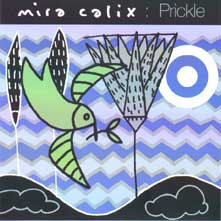 The new EP from Mira Calix comes with 2 tracks. One by Mira Calixherself, and one Andrea Parker remix from her first album. The MiraCalix track is divided into four parts, and starts out with roughmachinery sounds and a dark static flowing from side to side. A sawwave and beautiful voice then coats these sounds, accompanied by a slowclassical piano melody. The machinery and static morph into a complexrhythm at the very top of the sound range, with a low bass beat in thecenter. The soft voices make sounds that compliment the saw-wave synthmelody very nicely. They warmed my heart. After the beat ends, a flutemelody and a dirty resonance (much like a storm or crickets) arrives.This is coupled by sounds of flapping water, like a seal clapping.Weird stuff. This track is very, very, very peaceful, and could bringme up when I'm at my lowest low. Parker's remix is darker and more beatoriented, and while it's ok, it doesn't evolve over the course of thetrack and gets old.
The new EP from Mira Calix comes with 2 tracks. One by Mira Calixherself, and one Andrea Parker remix from her first album. The MiraCalix track is divided into four parts, and starts out with roughmachinery sounds and a dark static flowing from side to side. A sawwave and beautiful voice then coats these sounds, accompanied by a slowclassical piano melody. The machinery and static morph into a complexrhythm at the very top of the sound range, with a low bass beat in thecenter. The soft voices make sounds that compliment the saw-wave synthmelody very nicely. They warmed my heart. After the beat ends, a flutemelody and a dirty resonance (much like a storm or crickets) arrives.This is coupled by sounds of flapping water, like a seal clapping.Weird stuff. This track is very, very, very peaceful, and could bringme up when I'm at my lowest low. Parker's remix is darker and more beatoriented, and while it's ok, it doesn't evolve over the course of thetrack and gets old.
Read More
- Administrator
- Albums and Singles
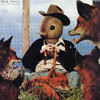 Vote Robot are Canadian duo Scott August and Kevin Rivard and "In MeormNA" is their second album, first on CD, for Scratch Recordings.Thirteen mostly 1 to 3 minute tracks, all with seemingly non-sensicaltitles, provide about 33 minutes total of sparse glitch-flow. A littlesticker on the jewel case proudly declares "NO laptops, sequencers,samplers, drumboxes, etc." so I'm assuming these are improvised pieces.What's more pretentious - declaring what you do use or what you don'tuse to make music? Judging from the disc's cute and cuddly animalthemed artwork, I don't think Vote Robot take themselves all thatseriously, unlike, say, the Rastermusic posse. The sound palette isvaried but maintains an anonymity. It sounds like line noises, foreverechoing input/output pops, dismembered tones/drones/notes, morse codeblips, the gentle shuffling of small objects, etc. It's very warm andeasygoing and Oval-like at times, only more 'musical' and, ultimately,listenable. A few tracks are a tad noisier than the rest but certainlynot enough to disrupt the pleasantness of it all.
Vote Robot are Canadian duo Scott August and Kevin Rivard and "In MeormNA" is their second album, first on CD, for Scratch Recordings.Thirteen mostly 1 to 3 minute tracks, all with seemingly non-sensicaltitles, provide about 33 minutes total of sparse glitch-flow. A littlesticker on the jewel case proudly declares "NO laptops, sequencers,samplers, drumboxes, etc." so I'm assuming these are improvised pieces.What's more pretentious - declaring what you do use or what you don'tuse to make music? Judging from the disc's cute and cuddly animalthemed artwork, I don't think Vote Robot take themselves all thatseriously, unlike, say, the Rastermusic posse. The sound palette isvaried but maintains an anonymity. It sounds like line noises, foreverechoing input/output pops, dismembered tones/drones/notes, morse codeblips, the gentle shuffling of small objects, etc. It's very warm andeasygoing and Oval-like at times, only more 'musical' and, ultimately,listenable. A few tracks are a tad noisier than the rest but certainlynot enough to disrupt the pleasantness of it all.
samples:
Read More
- Administrator
- Albums and Singles
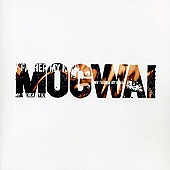 When I heard talk about this, I was rather excited. It seemed to bepart of a collaborative effort — perhaps with four contributors allbasing music around selected Hebrew prayers. Arthur Baker was allegedlyat the helm of this project, with a superstar team which includedengineer Steve Albini, and a completion to be mastered at Abbey Road.But what happened in the meantime? Some plug must have been pulledsomewhere and us, the consumers are left with this $6 remnant whichmimics a dangling participle. Mogwai's one-track single here stretchesabout twenty minutes, and if you've seen them live at all in the lastyear, you've heard it already — it's the very last track they've beendoing in concert — you know, the one that gave me hearing damage in myleft ear in Boston and set the PA on fire in Baltimore. The song isinstrumental and starts off quiet and peaceful, with a repeated themeand builds and builds and builds, to a blurry, gritty climax. Strangelyenough, however, there seems to be so much compression performed onthis in the mastering process that it feels like it came in on the samevolume it goes out in. It's not -bad- per se and it sure as hell rocksout, yet on it's own, I'm rather disappointed. I feel it's sort ofmissing something. This song would be great at the end of this year's"Rock Action" LP or on a compilation with four other remotely anthemic20 minute-long pieces. I'm going to suggest this item only for the bigfans who can't live without a recording of their concert finale.
When I heard talk about this, I was rather excited. It seemed to bepart of a collaborative effort — perhaps with four contributors allbasing music around selected Hebrew prayers. Arthur Baker was allegedlyat the helm of this project, with a superstar team which includedengineer Steve Albini, and a completion to be mastered at Abbey Road.But what happened in the meantime? Some plug must have been pulledsomewhere and us, the consumers are left with this $6 remnant whichmimics a dangling participle. Mogwai's one-track single here stretchesabout twenty minutes, and if you've seen them live at all in the lastyear, you've heard it already — it's the very last track they've beendoing in concert — you know, the one that gave me hearing damage in myleft ear in Boston and set the PA on fire in Baltimore. The song isinstrumental and starts off quiet and peaceful, with a repeated themeand builds and builds and builds, to a blurry, gritty climax. Strangelyenough, however, there seems to be so much compression performed onthis in the mastering process that it feels like it came in on the samevolume it goes out in. It's not -bad- per se and it sure as hell rocksout, yet on it's own, I'm rather disappointed. I feel it's sort ofmissing something. This song would be great at the end of this year's"Rock Action" LP or on a compilation with four other remotely anthemic20 minute-long pieces. I'm going to suggest this item only for the bigfans who can't live without a recording of their concert finale.
samples:
Read More
- Administrator
- Albums and Singles
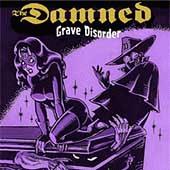 The common misconception about punk is that no one knew how to play.Truth is, many a band were solid from the start and became all the moreaccomplished with time. A good example is the turbulent, many membered,up and down, off and on again run of The Damned (which I'm a longtimefan of). And here we are a quarter century later, five years after thelast album, with 13 new studio tunes. Finally, something new to add tothe live set lists. Alongside vocalist Dave Vanian, fellow foundingmember Captain Sensible is finally back in the fold. Vanian's richvoice sounds as good as ever as he indulges in his gothic silver screenfantasies while the good Captain indulges in his own Floyd meetsHendrix guitar stylings. Monty Oxy Moron adds plenty of keys andbassist Patricia Morrison (Vanian's wife, ex-Gun Club and Sisters ofMercy) and new and improved drummer Pinch provide a strong rhythmsection with backing vocals by all. "Grave Disorder" not only soundsfresh and new, it sounds like The Damned - that colorful mix of sillyfun, romantic horror, melodic pop and punk rock. They sound great andevery track is thumbs up. Lyrically they once again take the piss outof politicians, including barely elected Bush in "W", and religiousfanatics, as well as internet junkies, John Lennon and Michael Jackson."Democracy?" and "Would You Be So Hot (If You Weren't Dead?)" areinstant classics with irresistible melodies. "Song.com" features somemean organ soloing and "Absinthe" some theremin atmosphere by Vanian."Amen" winds down nicely with several minutes of beach side samples andsynth. Captain's "Neverland", originally from his '96 solo album "MadCows & Englishmen", is re-recorded with Vanian on vocals. "Beautyof The Beast" is a classic Vanian piano ballad circa "Phantasmagoria",a fitting conclusion. It was worth the wait! Get the gold logo embosseddigipack version with 12 page lyric insert if you can. The Damned areon tour in the States through early November then on to the UK for therest of the year.
The common misconception about punk is that no one knew how to play.Truth is, many a band were solid from the start and became all the moreaccomplished with time. A good example is the turbulent, many membered,up and down, off and on again run of The Damned (which I'm a longtimefan of). And here we are a quarter century later, five years after thelast album, with 13 new studio tunes. Finally, something new to add tothe live set lists. Alongside vocalist Dave Vanian, fellow foundingmember Captain Sensible is finally back in the fold. Vanian's richvoice sounds as good as ever as he indulges in his gothic silver screenfantasies while the good Captain indulges in his own Floyd meetsHendrix guitar stylings. Monty Oxy Moron adds plenty of keys andbassist Patricia Morrison (Vanian's wife, ex-Gun Club and Sisters ofMercy) and new and improved drummer Pinch provide a strong rhythmsection with backing vocals by all. "Grave Disorder" not only soundsfresh and new, it sounds like The Damned - that colorful mix of sillyfun, romantic horror, melodic pop and punk rock. They sound great andevery track is thumbs up. Lyrically they once again take the piss outof politicians, including barely elected Bush in "W", and religiousfanatics, as well as internet junkies, John Lennon and Michael Jackson."Democracy?" and "Would You Be So Hot (If You Weren't Dead?)" areinstant classics with irresistible melodies. "Song.com" features somemean organ soloing and "Absinthe" some theremin atmosphere by Vanian."Amen" winds down nicely with several minutes of beach side samples andsynth. Captain's "Neverland", originally from his '96 solo album "MadCows & Englishmen", is re-recorded with Vanian on vocals. "Beautyof The Beast" is a classic Vanian piano ballad circa "Phantasmagoria",a fitting conclusion. It was worth the wait! Get the gold logo embosseddigipack version with 12 page lyric insert if you can. The Damned areon tour in the States through early November then on to the UK for therest of the year.
samples:
Read More
- Administrator
- Albums and Singles
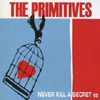 This EP surfaces a whole 20 years after the last full album from this Coventry, UK-based quartet. These four songs are short enough to grace a 7" and the songs are of the same caliber of what made the group so popular 25 years ago. It's a brief teaser/taster of hopefully more punchy, catchy, sugar-coated pop to come.
This EP surfaces a whole 20 years after the last full album from this Coventry, UK-based quartet. These four songs are short enough to grace a 7" and the songs are of the same caliber of what made the group so popular 25 years ago. It's a brief teaser/taster of hopefully more punchy, catchy, sugar-coated pop to come.
An uncountable amount of British pop bands seem to have followed the same exact trajectory: become media darlings with a few singles; release an album; tour the world; release a second album; implode. The Primitives made waves worldwide with their first two albums, Lovely and Pure, and, like other contemporaries, their third album was such a commercial flop that their bloated record labels found it unnecessary to release overseas. Record labels blame artists for going over budget, biographers and artists blame fickle critics, but in reality, if the magic simply isn't there, bands can't continue very well. There wasn't a lot of magic in Galore, Primitives 1991 album: it didn't command attention like songs like "Crash" or "Way Behind Me" did on previous albums.
Never Kill a Secret thankfully doesn't "pick up where they left off," it's a return to the infectious jangly rock the band were quite good at for their first two albums. Whether the modern media outlets catch on to these pop gems seems unnecessary as it sounds like the Primitives are enjoying themselves.
"Rattle My Cage" is clearly the hit song despite not being the title track. It launches the EP with a pounding rhythm, is met with a bopping riff, and Tracy Tracy's voice sounds unchanged from when I first heard them. To me it's a success as it's hard not to sing along with the chorus by the second time it comes around and long after it's over it's still circling around in my head. This isn't a deep thought, a political statement, nor a comment on the mess the world has become (news flash: the world was a mess in the '80s too), it's not mopey or gloomy, it's a 3.5 minute slice of fun. Go ahead, watch the video and try not to crack a smile.
Side A ends with the Lee Hazlewood composition (recorded by Suzi Jane Hokom) "Need All the Help I Can Get," a fierce '60s girl pop should-have-been anthem. Side B opens with the fun-in-the-sun title track, and while it's not a bad song, it's dangerously close to that cheese border. Tracy Tracy's voice is so captivating and warm on this song that it's all too easy to forgive them. Despite being the title song, it's certainly not the hit of the EP, and I can visualize this song triggering a beer/bathroom break at their live shows. Like side A, side B ends with a cover, "Breakaway," originally by Toni Basil (yes she recorded more than 1 song), and like most of the Primitives best songs, it's a throwback to the sassy side of the '60s girl group sound.
Knowing the currently popular music trends I'm having a tough time believing that The Primitives will gain new audiences, despite them sounding (and remarkably looking) just as fresh as they did 25 years ago. I hate to see them making the rounds as a "retro" touring act but unfortunately that's what they will most likely have to keep doing in order to build momentum again. I wouldn't miss the show, however, if it ever comes close.
samples:
Read More
- Administrator
- Albums and Singles
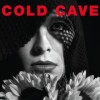 Cold Cave's embarrassing attempt at crossover success opens with "The Great Pan Is Dead," a dull, emotionally overwrought synth-rocker slathered in Wes Eisold's affected, fake British accent (he's from Boston) that sounds like a nu-goth approximation of the Killers. Cold Cave may be aiming to win over the synth-pop revival crowd, but the Killers are more popular than Cold Cave (and headlining sold-out arenas) for one simple reason—they write better tunes.
Cold Cave's embarrassing attempt at crossover success opens with "The Great Pan Is Dead," a dull, emotionally overwrought synth-rocker slathered in Wes Eisold's affected, fake British accent (he's from Boston) that sounds like a nu-goth approximation of the Killers. Cold Cave may be aiming to win over the synth-pop revival crowd, but the Killers are more popular than Cold Cave (and headlining sold-out arenas) for one simple reason—they write better tunes.
I wouldn't bother to complain about Cherish the Light Years, Cold Cave's second album, if I had not expected more from the band. I fell in love two years ago with Cremations, a collection of abrasive, lo-fi noise-pop sketches, demos and live tracks that was given wide release on Hospital Recordings (run by Prurient's Dominick Fernow, who also plays in Cold Cave). Cremations remains their most rewarding work—they signed to Matador soon after the initial release of Love Comes Close, their first full-length, which cranked down the volume and shone light on their '80s new wave influences. It was a risky move, but Cold Cave smartly balanced the noise and pop halves of their sound, and Love Comes Close was on target more often than it missed.
To be clear, I have no issue with a band recognizing its popular appeal and tailoring its material to commercial audiences. In fact, it can be a smart move for a band making appealing music to focus on its pop smarts and expand its fan base; it's been done well by too many synth-pop bands to count over the past 30 years. The trouble is that to succeed, a band needs to have great songs, not just reference sounds that are currently in vogue (or "influences," as bands typically call them).
On Cherish the Light Years, Cold Cave's Xerox machine is in good working order. They lean heavily on New Order and Depeche Mode blueprints, shitting out synth presets and clunky melodies at every turn, but their songs are nowhere close to as smart or creative. These songs are faceless, lacking a sense of personality, and hardly original; they would sound at home if played by any '80s revivalist act on the indie circuit. Granted, the album is essentially focus-grouped to reach fans of such music—its best song, "Confetti," is the aural equivalent of the band crossing its fingers for a FADER Magazine cover story—but will alienate fans of Cold Cave's previous work as a result.
As icing on the cake, the mastering job on Cherish the Light Years is beyond horrific—all traces of sonic detail squashed together in the mix, equalized and compressed to infinity; everything pushed completely into the red for maximum impact at radio. Cold Cave's album is as much a victim of the last decade's loudness war as, say, Britney Spears' latest will be (the difference being that Britney will actually get radio play, so has a better excuse for botched mastering). All said, Cherish the Light Years reminds me how disappointing it can be hearing a once capable band make a bid for crossover stardom without writing a proper batch of songs first.
Samples:
Read More
- Administrator
- Albums and Singles
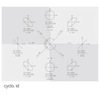 Ryoji Ikeda and Carsten Nicolai have made some of the most intense, exciting and intriguing electronic music of the last 20 years, mostly apart but they came together as Cyclo. ten years ago with a terrific self-titled album. When the follow up landed on my doorstep recently, I was expecting something great and got something unexpectedly better than I hoped for instead. Their debut was only a warm up, a training session. id is the real deal. Combining Nicolai’s hard yet yielding rhythms with Ikeda’s lust for ear-bending sounds, the duo has created a stunning album that aims to fuse their music (and their concept of music) with the visual arts.
Ryoji Ikeda and Carsten Nicolai have made some of the most intense, exciting and intriguing electronic music of the last 20 years, mostly apart but they came together as Cyclo. ten years ago with a terrific self-titled album. When the follow up landed on my doorstep recently, I was expecting something great and got something unexpectedly better than I hoped for instead. Their debut was only a warm up, a training session. id is the real deal. Combining Nicolai’s hard yet yielding rhythms with Ikeda’s lust for ear-bending sounds, the duo has created a stunning album that aims to fuse their music (and their concept of music) with the visual arts.
 
Sonically, id is flawless. Although divided into 11 tracks, it feels like one long progression. Beats are persistent, omnipresent but they crack and falter repeatedly only to flow again as if nothing happened. The rhythms are interesting but at the end of the day they are pretty much standard beats.
The draw of id is the nature of the sounds which bring to mind Ikeda’s exploration of data as a sound source over the last few years. The range of sounds seem to be limited to beeps, blips, and electronic interference but there are surprising depths to this palette. Part of this comes from the mastering (or to be more precise the lack of mastering for reasons explained below). The dynamic range is huge, the frequencies go from the ultra low (I was listening to this in my car and my mirrors all pulsed to the beats) to I assume to inaudibly high. The music is electrifying; at points I get a serious case of shivers down my spine as the sounds pummel my auditory cortex into submission.
Yet it is not Ikeda and Nicolai’s intention to make merely an album of glorious sounds. Not one millisecond of id had been composed with a final sound in mind. Instead, each sound was chosen for its appearance on an oscilloscope as Cyclo have intended the album to be listened to while simultaneously watching the output of an oscilloscope being fed the audio. They have left the audio deliberately unmastered, as mastering (and MP3 compression) would destroy the images they had assembled. Unfortunately, oscilloscopes are the kind of instruments that tend to be difficult to find in normal life (despite my best efforts). It is frustrating to be listening to an album when it is intended to be absorbed as a synaesthetic blend of visual and audio art. Granted, Ikeda and Nicolai have a "publication" planned that will present the visuals but it is unclear whether this will be a printed publication (which would miss out on the audio) or a DVD (which is probably how this should have been released in the first place).
Despite the annoyance of not being able to obtain access to an oscilloscope, id is an incredible album. I have a lot of time for both Ikeda and Nicolai but even as a long-term fan, this has been a total joyous shock to my ears. To have the complete picture (pun intended) would be perfect but in the meantime, the audio alone is more than enough to occupy me. Of course, if anyone reading this knows of a good (free) oscilloscope program for Mac, please let me know!
samples:
 
Read More
- Administrator
- Albums and Singles
Genesis Breyer P-Orridge has been a key figure of the underground music scene for over 30 years. A cult artist in prepunk and post-punk groups Throbbing Gristle (1975 to 1981) and Psychic TV (1981 to present), he is considered to be the father of industrial music and a pioneer of acid house and techno. Not content with breaking new ground in music, Genesis has also used his position at the limits of society to challenge the very fundamentals of biology.
Transformation is, indeed, central to his life. He became a she to resemble his beloved Lady Jaye, now deceased. With peroxide hair, full lips and gold teeth, Genesis does not go unnoticed. A unique life, modeled on his other, Lady Jaye, who remains an integral part of himself. Without subscribing to any movement but living life as the ultimate experiment, he has made his body a work of art.
A kaleidoscopic collection of moving surfaces, composed of interviews (Orlan, Peaches, Peter Christopherson), role plays, concerts and his day to day life, comes together to paint a multi-faceted profile of this pioneer of industrial music and in doing so, exposes the abundant yet inherently elusive nature of his creativity.
http://marielosier.net/the-ballad-of-genesis-and-lady-jaye/
Read More



